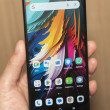Review: Samsung Vibrant
Camera
Samsung has borrowed yet more software from its actual camera products and carried them over to the Galaxy S line. The camera can only be launched via a software key on the Vibrant's screen. Why there isn't a physical camera key is baffling. Samsung generally likes camera keys. Instead, users are stuck with on-screen controls only.
Once the camera is up and running, there are controls on the left and right side of the display to change the Vibrant's settings. A focusing square is in the center of the screen. The Vibrant lets users touch-to-focus, meaning if there's something in particular they want the Vibrant to focus on, simply touch it on the screen and that's where it will focus.
The controls are extensive, and offer features such as Smile Shot, Panorama, Continuous; scene controls (notably, it includes one for "Fireworks"); white balance control; ISO (sensitivity) settings; metering and even image stabilization.
The most interesting feature is that the Vibrant lets you fine tune the resolution it uses to capture photos. You have the standard 4:3 settings at 5, 3.2, 2, and 0.3 megapixels. You can also choose 16:9 widescreen settings, which are 4, 2.4, 1.5, and 0.4 megapixels.
The Vibrant takes about a second to focus before it captures images. The "shutter" button is placed at the bottom of the Vibrant's display.
Gallery
The gallery application is the Cooliris-made one that's found on the HTC Nexus One. It offers stacks of photos that are organized by time/date. You can quickly jump back to photos taken months ago, and have an idea of when they were shot. It's a better way to to sort through a huge photo library, if you ask me, when compared to a huge grid of photos. Opening each stack of photos will show a grid.
Oddly, the Gallery features are really limited. You can share via Gmail, MMS, Picasa, and AllShare, but that's about it. There are no editing features to speak of.















 Hands-On with Samsung's Galaxy S Phones for the US
Hands-On with Samsung's Galaxy S Phones for the US
 Samsung Refreshes Galaxy S Series with S Pen, New Cameras
Samsung Refreshes Galaxy S Series with S Pen, New Cameras
 Samsung Refines its Foldable Phones
Samsung Refines its Foldable Phones
 Samsung Upgrades its Wearables
Samsung Upgrades its Wearables
 Samsung S24 Series Adds More AI, Updates the Hardware
Samsung S24 Series Adds More AI, Updates the Hardware
 Samsung Vibrant (Galaxy S)
Samsung Vibrant (Galaxy S)


